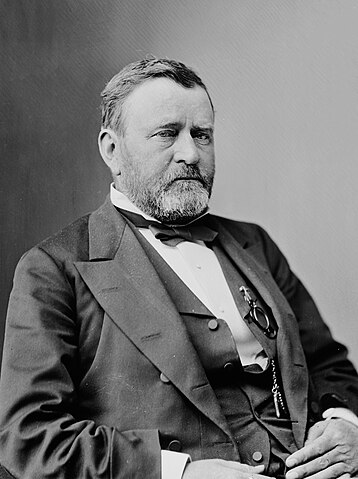Ulysses S. Grant, the 18th President of the United States, is primarily remembered for his remarkable contributions during the American Civil War, but he also left a lasting legacy in other areas. Here is a look at the legacy of Ulysses S. Grant:
Military Leadership:
- Grant is celebrated as one of the greatest military commanders in American history. He played a pivotal role in the Union victory during the American Civil War. His notable campaigns include the capture of Vicksburg and the battles of Shiloh, Chattanooga, and Appomattox Court House.

Grant’s Approach:
- Grant’s relentless pursuit of Confederate armies and his willingness to engage in protracted battles marked his approach. He famously declared that he would “fight it out on this line if it takes all summer” during the Battle of Spotsylvania Court House. His strategy of attrition wore down the Confederacy and helped bring the war to a close.
Appomattox and Surrender:
- On April 9, 1865, General Robert E. Lee surrendered to General Grant at Appomattox Court House, effectively ending the Civil War. Grant’s generous surrender terms, which allowed Confederate soldiers to return home and keep their horses, helped with post-war reconciliation.
Presidential Politics:
- After the Civil War, Grant’s popularity and reputation led to his election as the 18th President of the United States in 1868 and his re-election in 1872. As President, he worked to protect the rights of African Americans in the South and supported the ratification of the 15th Amendment, which granted voting rights to African American men.
Civil Rights Efforts:
- Grant’s administration fought against the rise of the Ku Klux Klan and used federal power to protect the rights of African Americans during the tumultuous Reconstruction era.
Foreign Policy:
- Grant’s presidency also featured important foreign policy achievements, such as the Treaty of Washington in 1871, which resolved disputes with Great Britain related to the American Civil War. The treaty established arbitration as a means of settling international disputes.
Legacy:
- Ulysses S. Grant’s legacy is one of military brilliance, steadfastness, and a commitment to securing the Union and advancing civil rights. He is remembered as a hero of the Civil War who played a crucial role in reuniting the nation.
Memoirs:
- Grant’s memoirs, written while he was dying of throat cancer, are regarded as one of the greatest works of American literature. Published by Mark Twain, the memoirs provided financial stability for Grant’s family after his death and offer a personal perspective on the Civil War.
Monuments and Memorials:
- Ulysses S. Grant is honored with numerous monuments and memorials, including the General Grant National Memorial in New York City, often referred to as Grant’s Tomb, which is his final resting place.
Ulysses S. Grant’s legacy is indelibly linked to his role in the Civil War, but his contributions extended to the presidency and broader efforts to ensure the rights of all Americans, particularly African Americans, during a transformative period in the nation’s history.











